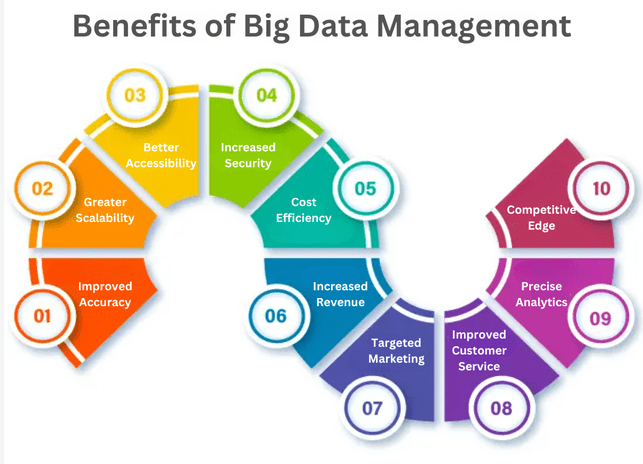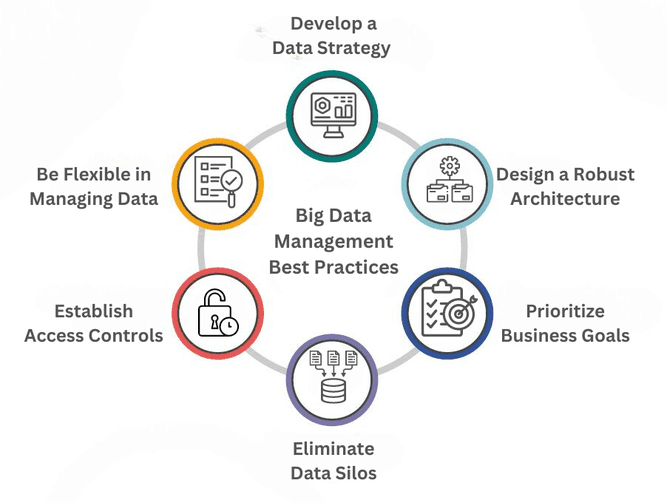Did you know that by 2025, it is estimated that 463 exabytes of data will be created every day? This shows how important big data management is for businesses and organizations. It helps make smart decisions, better understand customers, and drive innovation. As data analytics grows, following best practices in big data management becomes more important. It affects marketing, product development, and improving customer service.
What is Big Data?
Big data refers to the vast and complex sets of data generated from various sources, including social media, sensors, transactions, and more, that are too large or intricate for traditional data-processing tools to handle.
It encompasses three main characteristics: volume, velocity, and variety, often referred to as the "3 Vs," and requires advanced technologies and methods like machine learning, artificial intelligence, and cloud computing to analyze and extract valuable insights for decision-making and strategic planning.
What is Big Data Management?
Big data management is about organizing and governing huge amounts of data, including both structured and unstructured data. With more data coming from sources like social media, logs, and sensors, it's key to have good strategies for data quality and access. Knowing what big data management is vital for companies to use their data well and stay ahead.
Companies use complex big data architectures to manage their data. These architectures help with storing, processing, and finding data efficiently. Old data warehouses can't handle the changing and varied nature of today's data, so businesses look into new technologies that go beyond traditional setups.
In short, big data management is a structured way to use a lot of data. It helps companies find valuable insights and drive innovation in a data-focused world.
Why is Big Data Management Important?
Big data management turns raw data into useful insights. It helps companies save money and work better. Proper big data management helps companies make better decisions with accurate info.
Using business intelligence tools is another big plus. You can improve your online image and brand by looking at social media. This leads to marketing that really speaks to your customers, building loyalty.
Knowing what customers buy helps businesses change their products. This makes your marketing stronger and puts you ahead of your competitors. Fast analysis of data keeps you quick to respond in a fast-changing market.
Benefits of Big Data Management
Effective big data management brings many advantages to your organization. The benefits of big data management described below will help you improve your operations and make better decisions.
Improved Accuracy
Getting data right means you get better analytics. With better data quality, you can make decisions based on solid insights.
Greater Scalability
Big data management systems grow with your data. This lets companies expand without losing performance.
Better Accessibility
With easier access to data, teams can find and use information quickly. This helps with teamwork and new ideas.
Increased Security
Strong security and governance keep sensitive info safe. This builds trust with customers and partners, helping your reputation.
Cost Efficiency
Streamlining processes and using resources wisely cuts costs. This efficiency helps increase revenue by using resources better.
Increased Revenue
Using data to guide your marketing and customer service improves your sales. This leads to increased revenue.
Targeted Marketing
Big data helps you focus on specific customers. This makes your marketing hit the mark, improving sales and loyalty.
Improved Customer Service
Big data can help you better meet customer needs, which leads to happier customers and more of them staying with you.
Precise Analytics
Big data gives you strong analytical tools. These tools help you make smart decisions and solve problems before they start.
Competitive Edge
Using these benefits, your organization stays ahead. Data-driven strategies help you beat the competition.

Major Challenges in Big Data Management
Today, organizations face big hurdles in managing big data, which makes it hard to get useful insights. Knowing these challenges will help you develop good strategies for handling data well.
Handling Large Volumes of Data
Businesses generate a huge amount of data every day. Handling this data from different sources is complex. Without the right systems, companies may not be able to store, process, or analyze the data. This can lead to inefficiencies and missed chances.
Addressing Data Quality Issues
Data quality is a big problem. Things like inconsistent entries, duplicates, and errors come from different data input methods. Companies need strong ways to check and clean the data. This makes sure decisions are based on correct and trustworthy info.
Merging Different Data Sets
Combining different data sets is difficult. Data from different departments or sources might not be in the same format or standard. Careful integration and reconciliation are needed to get a single view of the data, which keeps the data consistent.
Getting Data Ready for Analytics Applications
Getting data ready for analytics is not easy. It often needs a lot of work to make it usable and relevant. This can take a lot of time and resources, especially with different data types and formats.
Making Sure Big Data Systems Can Scale as Required
As companies grow, their data management systems must grow, too. It's important that systems can handle more work without getting slower. Companies need scalable infrastructure and technology to keep up with growth and new data needs.
Managing and Governing Large Data Sets
Good governance is crucial for large data sets. Without strong policies and procedures, there's a risk of not following the law and security issues. Setting up detailed governance frameworks helps manage big data challenges. It protects sensitive information and encourages responsible data use.

Best Practices for Big Data Management
To manage big data well, it's key to follow best practices. These practices make processes smoother, increase efficiency, help meet your business goals, and manage data well.
Develop a Comprehensive Strategy and Roadmap
Creating a detailed strategy and roadmap is vital for big data success. It helps you see what data your company needs and ensures that all projects align with your big business aims.
Design and Implement a Robust Architecture
A strong architecture is crucial for handling big data. It includes systems for storing, processing, and analyzing data, keeping your systems consistent and reliable.
Prioritize Business Goals and Needs
Working together as a team is important when starting big data projects. Focusing on business goals and understanding what users need leads to better data use, which, in turn, makes decision-making more effective.
Eliminate Isolated Data Silos
Getting rid of data silos helps information flow smoothly between departments. This makes data easier to use, supports teamwork, and helps manage data flexibly.
Establish Strong Access and Governance Controls
Keeping data safe and following the law is crucial. Setting up strong controls for access and governance protects sensitive info. It's a key part of managing big data well.
Be Flexible in Managing Data
Being flexible with data lets your company adjust to new needs and fully use analytics. This flexibility is key to using your big data to its fullest.

The Future of Big Data Management
You're on the edge of a big change in big data management. Companies are using more data than ever before. Cloud computing is leading the way with solutions that handle large data easily. Adding AI and machine learning improves data analysis.
Cloud Storage
Cloud storage is changing how we manage data. It lets companies store and analyze data without old limits. You can easily change how much storage you use, making managing big data efficient and affordable. This makes cloud computing crucial for the future of big data.
AI and Machine Learning
AI and machine learning help companies quickly analyze large amounts of data, finding patterns and insights. These tools help you predict the future and make smart choices easier, helping you stay competitive.
Data Democratization
Data democratization is making data available to everyone in a company. This change helps everyone make decisions based on data. As big data management grows, expect a team effort where different skills work together to use data well.
DataOps
DataOps is making data workflow better, and teams work together. It focuses on being quick and always getting better. DataOps helps with data management challenges, making data faster and better, and adapting to business and tech changes.
| Trend | Description | Benefits |
| Cloud Storage | Scalable storage solutions for managing large datasets. | Cost-effective, flexible, and accessible. |
| AI and Machine Learning | Advanced analytics is driven by intelligent algorithms. | Quick insights, improved accuracy, and informed decisions. |
| Data Democratization | Accessible data for non-technical users. | Empowerment, collaboration, data-driven culture. |
| DataOps | Streamlined workflows for data management. | Agility, efficiency, continuous improvement. |
How Kohezion Can Help You with Big Data Management
Kohezion offers strong support for big data management. It's perfect for companies looking to improve their data strategies. The platform makes organizing your data easy, making it simple to access and use for better decisions.
Kohezion has powerful tools for collecting, integrating, and visualizing data. These tools help your team get valuable insights quickly. They also make handling large amounts of data easy, solving the common problems of big data.
Kohezion also focuses on data governance, ensuring you follow the rules and keep data safe, allowing you to handle sensitive information safely and find new ways to make money with smart data strategies.
Conclusion
Big data management involves handling large amounts of data and helps make better decisions. Knowing the value of big data lets companies find new ways to grow and innovate.
Using the best methods can help companies overcome issues like handling more data, keeping data quality high, and making data easy to access. This leads to better customer service, more accurate results, and more money. These benefits show how important good big data management is for success.
Staying up-to-date with big data trends helps you use this powerful tool well. Understanding data management will help your company stay ahead in its field and ensure ongoing growth.
To learn how Kohezion can assist you with your big data needs, feel free to contact us anytime.
Start building with a free account
Frequently Asked Questions
Big data is typically categorized into three main types: structured, unstructured, and semi-structured data. Structured data is organized and easily searchable, like data in spreadsheets or databases. Unstructured data includes information that does not have a predefined format, such as emails, social media posts, or videos. Semi-structured data falls in between, containing some organizational elements but not fitting neatly into tables, like JSON or XML files.
The four key components of big data are volume, velocity, variety, and veracity. Volume refers to the amount of data being generated and collected. Velocity is about the speed at which data is created and needs to be processed. Variety indicates the different types of data, such as text, images, and videos, while veracity deals with the quality and accuracy of the data. Managing these components effectively is crucial for deriving meaningful insights from big data.
Examples of big data include social media activity, where platforms generate vast amounts of data from user interactions, posts, and comments. E-commerce transactions produce large datasets from customer purchases, browsing behavior, and reviews. Healthcare records create big data through patient histories, test results, and treatment plans. Smart devices like sensors and IoT devices collect real-time data on everything from weather patterns to machine performance.

